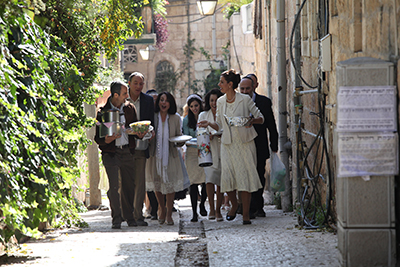Arts
Film
A ‘Balcony’ of Their Own

Highly enjoyable and intelligent, The Women’s Balcony delivers its serious messages with impeccable timing and grace. The film, which is playing in 25 cities nationwide, is perfect for moviegoers weary of superhero flicks or raunchy comedies.
The Israeli-made dramedy opens on a joyous Shabbat in Jerusalem. Members of a small middle class, presumably Mizrahi, Orthodox congregation walk to services for the bar mitzvah of the grandson of Ettie (Evelin Hagoel) and her husband, Zion (Igal Naor). Their friends and neighbors carry pots of home-cooked food for the kiddush.
Tragedy strikes when the women’s balcony collapses mid-service, leaving the rebbetzin in a coma, the elderly rabbi in shock and the sanctuary in ruins.
Left without a leader and a spiritual home, the congregants soon turn to young and charismatic ultra-Orthodox Rabbi David (Aviv Alush), who makes sure the congregation has a quorum for daily services and takes on the supervision of the synagogue’s renovations.
Rabbi David also brings to the relaxed congregation an energy that the elderly rabbi hadn’t mustered in years—as well as a rigid religious zeal. Attributing the collapse of the balcony to the women’s immodest ways, he says that, like Torah, women are sacred and must be protected, which means “covered hair and modest dress.” He has the men bring home headscarves for their wives.
Community relationships are strained and arguments break out between the women who adopt the head covering and those do not. The strain comes to a breaking point after the renovations are complete and the women discover that there is no balcony; Rabbi David has shunted them off behind a mehitzah, to a side wing of the building.
Led by Etti, the women rebel, eventually leaving their husbands.
There is, of course, a happy ending to this gentle feminist fable. Rifts are healed, Rabbi David ousted and the community comes together once more.
Directed by Emil Ben-Shimon and written by Shlomit Nehama, The Women’s Balcony was a hit in Israel. It’s easy to see why, with the film’s light touch on current issues such as female empowerment and religious fundamentalism.
“I intended to criticize religious aggression in any form,” says Nehama, 47, in a recent interview, but “everyone interpreted it in his or her own way. There were attempts to attach a political agenda to the film, although the film itself does not have any political reference.”
The story grew out of a personal experience, she notes. Several years ago, she returned to the traditional Bukharian Jerusalem neighborhood where she grew up and discovered that religious extremists had all but taken over.
Nehama also claims to have known men like Rabbi David who, motivated by money or politics, she says, “twist halacha to satisfy their own interests. In my movie, Rabbi David is motivated by a true belief that this is the only way to save this community.”








 Facebook
Facebook Instagram
Instagram Twitter
Twitter
Barbara Ann Paster says
A TERRIFIC movie! So heartwarming. It was a major hit in the New Hampshire Film Festival 2017. I LOVED it!!!